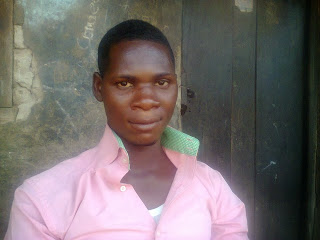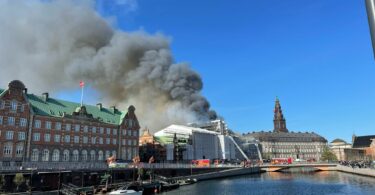AGYARAGU, Lafia, Nasarawa State, Nigeria – While nearly all his childhood friends had absorbing stories of their new journey to private primary schools, Samson Yusuf, 20, had little to share. His tales lacked in novelty, and his experience rather too awful to be told.
 Yusuf, who is currently preparing to take his West African Senior Secondary School Certificate Examination, listened to spellbinding stories his friends had of
Yusuf, who is currently preparing to take his West African Senior Secondary School Certificate Examination, listened to spellbinding stories his friends had oftheir new teachers, classmates, friends, and classroom and learning methods.
But his story was different, starting early in the morning when he trudged into the compound of a public school, LGEA Primary School in Gidinye in Nasarawa State.
 “We had no desks; all we did was seat on the floor,” Yusuf said, a little regretfully. “Our teachers rarely come around to teach us. We just come to school, play and go home some days.”
“We had no desks; all we did was seat on the floor,” Yusuf said, a little regretfully. “Our teachers rarely come around to teach us. We just come to school, play and go home some days.”His story mirrors the decaying nature of public education in Nigeria. From primary through secondary education, students are expected to be fully equipped to sit for all requisite examinations with relative ease, but cheating and mass failure have characterized results churned out by the West African Examination Council.
Public primary and secondary schools thrived in the 1970s and ‘80s. Graduating students then had what they needed to enroll in universities, polytechnics and colleges of education.
But that’s in the past as students now go through public schools with little teaching, poorly-equipped laboratories, dilapidated structures and scant motivation.
Some say lack of experienced and competent teachers, poor funding and teacher pay, inadequate school buildings and the increased pressure of a population explosion on already strained resources are all to blame for the dwindling quality of education throughout the country.
Wealthy Nigerians and parents who could afford relatively cheap fees send their children to private schools to give them the best education possible in Nigeria.
The differences between the public and private schools can be striking.
“Our teachers would always tell us that whether we were well taught or not, they’ll definitely get their salaries,” Yusuf said.
But Gift Audu, 21, who attended a Catholic primary school, St. John’s Nursery and Primary School in Agyaragu, Nasarawa State, had a different experience.
“Our teachers showed a lot of dedication,” said Audu. “They rarely missed classes; even if they did, it must be for cogent reasons. We were motivated to learn every day.”
With the passage of the Universal Basic Education Act into law in 2004 by the Olusegun Obasanjo-led administration, there were hopes that the provision of compulsory free education would put an end to illiteracy and facilitate the expansion of education opportunities to all children.
In rural Nigerian communities, students commonly learned their lessons under trees because of the absence of school buildings. Lack of desks and basic classroom furniture also beset rural public schools, and reports of truancy are not treated seriously.
“It pained me to see my childhood friends read and speak English fluently, while I had to grapple with understanding what those strange words mean,” said Yusuf. “I struggled to read my textbooks, but hardly made any effort to improve because the motivation wasn’t there.”
Though expensive, private schools have earned a reputation for discipline, hard work and an unusual commitment to teaching. And they will likely continue to enjoy greater patronage if public schools continue to remain in shambles.
“Of a truth, nearly all the brilliant pupils and students in our community attended private schools,” said Audu, who is aspiring to study economics at Federal University in Lafia. “I think the major reason can be traced to the fact that public schools here are lagging behind in terms of providing quality education.”
But it is possible to find good public schools in Nigeria, especially primary and secondary schools in cities and major towns.
The Universal Basic Education scheme brought in its wake the reconstruction of dilapidated buildings and the provision of other requisite school facilities, but little has been achieved in terms of preparing students for higher educational achievements in tertiary institutions.
“You hardly find the high level of seriousness seen in privates in public schools,” said Augustine Samson, 19, who just completed his high school education at Government Secondary School in Gidinye. “Sometimes we just saw our teachers and that’s all. We were rarely motivated to do something valuable after classes.”
According to a 2013 piece in Vanguard by Adewale Kupoluyi, who teaches at the Federal University of Agriculture in Abeokuta in Ogun State, Nigeria spends less than 9 percent of its budget on education, while smaller African nations spend two or three times that amount.
Besides poor funding, a myriad of problems bedeviling public primary and secondary education in Nigeria include a shortage of quality staff, infrastructure and facilities such as laboratories, lack of discipline and teacher strikes over low pay.
Audu thinks the situation is not entirely irredeemable.
“Perhaps if teachers are given the necessary incentives, and students stay motivated and governments stop neglecting public education,” Audu said, “things will change for good.”
But with the neglect of public education by federal and state government, the goal of Nigeria achieving, by the end of this year, Education for All – a movement championed by the United Nation Education, Scientific and Cultural Organization (UNESCO) to provide quality basic education to children and adults – remains unrealistic.
“I finally went on to join Shalom International College, Agyaragu after I left primary school,” Yusuf said. “It turned out to be an awesome experience as I became adept at reading and speaking English within a short time. If anything, I’ll continue to remain grateful to my friends for opening my mind to the beauty and excellence therein in private schools.”
Linus Okechukwu is a Senior Reporter for Youth Journalism International.
***
Your tax-deductible contribution can help support Linus Okechukwu
and other students at this global nonprofit at



